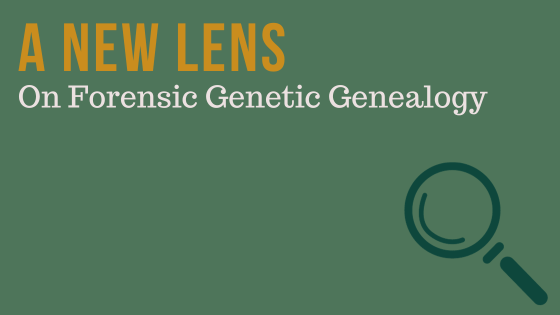Today’s guest blog is written by Marc McDermott, Genealogy Educator / Genetic Genealogist, Genealogy Explained
Forensic Genetic Genealogy (FGG) is a term that has gained traction primarily for its instrumental role in leveraging genetic and genealogical methods to aid law enforcement in criminal investigations and the identification of human remains. This process involves the meticulous comparison of DNA profiles obtained from crime scenes or unidentified remains with close genetic DNA profiles or matches, a strategy that has transformed cold and stale criminal case investigations by providing fresh leads and narrowed focus.
The emergence of this technique in public consciousness can be traced back to a landmark event — the apprehension of the “Golden State Killer” in April 2018, a breakthrough facilitated by FGG. This milestone unfurled a new pathway in forensic science, illustrating the potential of genetic and genealogical methodologies.
In 2020, Dr. Tracey Dowdeswell embarked on a groundbreaking endeavor to forge a comprehensive understanding of forensic genetic genealogy (FGG), initiating a project dedicated to creating a centralized registry of cases solved through FGG techniques. This initiative was rooted in the aspiration to track these cases through the justice system, evaluating how courts handle this emerging type of evidence.
The project seeks to foster academic insights and aid public authorities in shaping informed policies around FGG’s usage. This project includes a rich dataset accompanied by a user manual outlining the data collection and coding processes and offers an annotated bibliography and brief case digests, all housed on Mendeley Data.
To further the efforts of Dr. Dowdeswell, I’ve developed a supplementary online platform to bring her groundbreaking Forensic Genetic Genealogy Project closer to enthusiasts, researchers, and curious minds alike. It can be accessed here: https://www.genealogyexplained.com/igg-cases/
This platform, created in collaboration with Dr. Dowdeswell, is a user-friendly interface to easily navigate and understand the rich dataset amassed through her diligent research. It offers a lens to view it in a more accessible manner, allowing users to explore the public cases where FGG has been a crucial tool in finding leads.
This platform is crafted to be a supportive tool for professionals and students, encouraging them to explore this rich and evolving field with ease and understanding. Moreover, it stands as a humble endeavor while continuously acknowledging the foundational work executed by Dr. Dowdeswell and her team.
On this new platform, users can delve into over 600 solved criminal cases involving close to 300 perpetrators with more being added all the time. The database allows for seamless navigation with intuitive sorting and filtering options. You can tailor your exploration based on various criteria, including perpetrator names, case statuses, geographical locations of the crimes, and the FGG organization involved. Each case entry offers primary details and unfolds a rich narrative encompassing the investigations, the victims’ profiles, and insights into the criminal charges and court dispositions.
For instance, the entry for the Golden State Killer details everything you need to know about the investigation, criminal charges, and the publicly available information for 72 of his victims, giving users a holistic understanding of the case.
This user-friendly interface promises a deep dive into each case, offering a glimpse into the intricate details that mark the journey from investigation to resolution.
The platform is designed with a diverse target audience in mind, acting as a dynamic resource for a range of users, from law enforcement personnel engaged in comparative case analyses to academics researching the field and enthusiasts eager to learn more. By fostering easy accessibility to such a rich data repository, we aim to facilitate deeper understanding and encourage educational pursuits in the evolving field of forensic genetic genealogy.
With this new platform, we have taken a step towards making the expansive data of the Forensic Genetic Genealogy Project more accessible to a wider audience. We invite you to explore the platform and share your feedback to help us refine this tool for the benefit of all users.
WOULD YOU LIKE TO SEE MORE ARTICLES LIKE THIS? SUBSCRIBE TO THE ISHI BLOG BELOW!
SUBSCRIBE NOW!


